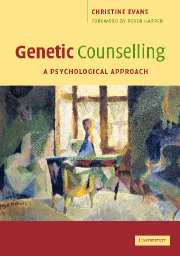Book contents
- Frontmatter
- Contents
- Acknowledgements
- Foreword
- Preface
- 1 An overview of genetic counselling
- 2 The psychological processes underlying genetic counselling
- 3 Understanding individual difference in genetic counselling using attachment theory
- 4 The role and skills of the counsellor and ideas from psychotherapy
- 5 Examples of the role and skills of the counsellor
- 6 The gene and the family system
- 7 Working with parents and children
- 8 The influence of the nature of the disorder on the consultation
- 9 The effect on the counsellor
- 10 The interview and non-directiveness
- References
- Index
9 - The effect on the counsellor
Published online by Cambridge University Press: 12 August 2009
- Frontmatter
- Contents
- Acknowledgements
- Foreword
- Preface
- 1 An overview of genetic counselling
- 2 The psychological processes underlying genetic counselling
- 3 Understanding individual difference in genetic counselling using attachment theory
- 4 The role and skills of the counsellor and ideas from psychotherapy
- 5 Examples of the role and skills of the counsellor
- 6 The gene and the family system
- 7 Working with parents and children
- 8 The influence of the nature of the disorder on the consultation
- 9 The effect on the counsellor
- 10 The interview and non-directiveness
- References
- Index
Summary
This chapter explores how working in medical genetics can be emotionally challenging for the counsellor and examines it under two broad headings: factors relating to the nature of the task and countertransference issues. The former relates to the fact that genetic counselling is inherently stressful and very painful for families and individuals. The latter refers to factors arising as a result of working with a particular individual, countertransference issues. The counsellor needs a diversity of the skills to work effectively to help and not be overwhelmed. This chapter will demonstrate how the counsellor's self-exploration can be personally beneficial and, if understood, it can enrich the overall encounter by adding another dimension of meaning to the behaviour of the patient and the interactional relationship. Regular supervision creates a safe psychological space for exploration and learning.
The nature of the genetic counselling task
The nature of the counsellor's task is complex and has been one of the main areas of interest in this book. At this point it is considered in relation to two areas: the particular skills mix required and the giving of ‘bad news’.
The skills
required Working in the field of medical genetics brings many exciting opportunities to study a speciality in the forefront of scientific medicine whilst also being in touch with the human side of the work, talking and working with people. This is rewarding and affords the counsellor the opportunity to develop these seemingly different aspects of the self, the scientific and more emotionally-attuned.
- Type
- Chapter
- Information
- Genetic CounsellingA Psychological Approach, pp. 153 - 174Publisher: Cambridge University PressPrint publication year: 2006
- 1
- Cited by



